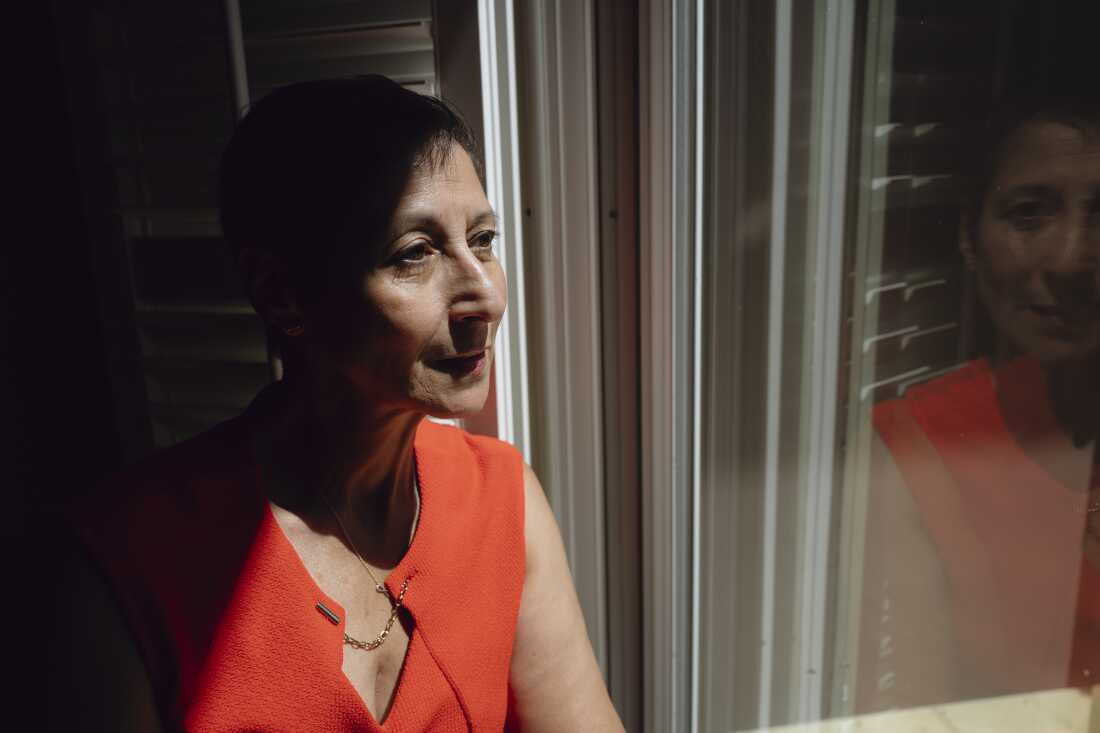Alzheimer’s was taking her reminiscence, so she began taking a brand new drug : Pictures


Myra Solano Garcia in Upland, California, 2024. Garcia has been dwelling with Alzheimer’s illness and is taking one of many two accepted medication available on the market to attempt to gradual its signs.
Zaydee Sanchez for NPR / @zaydee.s
disguise caption
toggle caption
Zaydee Sanchez for NPR / @zaydee.s
Learn half 1 of Jon’s story.
Medication cannot cease Alzheimer’s illness but. However generally, they will gradual it down.
“Issues have simply plateaued,” says Myra Solano Garcia, 66, who developed reminiscence issues in her 50s, and was recognized with Alzheimer’s 4 years in the past.
“I can drive. I can care for the home, I can prepare dinner,” she says, “all of that standard stuff that folks do.”
Solano Garcia credit the drug donanemab, which she started taking as a part of a medical trial on the College of Southern California.
The Meals and Drug Administration accepted the drug, now marketed as Kisunla, in July of 2024. It is certainly one of two medication accepted since 2023 that may clear the mind of sticky amyloid plaques, one of many hallmarks of Alzheimer’s.
However there isn’t a option to know whether or not Kisunla is the rationale Solano Garcia can nonetheless accomplish that a lot.
“We do not have the flexibility to say since you’ve taken the treatment, you have not declined,” says Dr. Lon Schneider, a professor at USC’s Keck Faculty of Medication who oversaw the donanemab trial there.
Each Kisunla and the opposite accepted drug, Leqembi, have been proven to decelerate the psychological decline of Alzheimer’s by greater than 25%. However that is in a gaggle of sufferers—a person might do significantly better, or not be helped in any respect.
A life, interrupted
Solano Garcia grew up in New Jersey as a part of a Cuban-American household with a lot of singers. She studied piano and voice in faculty. As a younger grownup, she made singing her profession.
“I performed Maria in West Aspect Story in summer season inventory,” she says. “I carried out at Carnegie Corridor and Fisher Corridor.”
Later, she moved to California and ran fundraising campaigns for faculties and universities.
It was in her early 50s that Solano Garcia started noticing issues together with her reminiscence.
A physician instructed her she had attention-deficit/hyperactivity dysfunction, and for years she mistakenly thought that was the issue. However her reminiscence stored getting worse.
The turning level got here throughout COVID, when she began a brand new job.
“Three months in, I spotted I could not do the work,” she says. “I could not keep in mind the folks’s names. I could not do the expertise.”
So Solano Garcia went to a neuropsychiatrist, who recognized her with Alzheimer’s illness and referred her to docs at USC.
“They requested, ‘Would you wish to be a part of the [donanemab] trial?’ and I mentioned, you wager I’d,” she says.
A mind cleared of plaques
Solano Garcia started stepping into for month-to-month infusions, which she did not thoughts, and psychological exams, which she discovered irritating. When the trial ended, she opted to proceed taking the drug.
It hasn’t restored her reminiscence or pondering.
However Solano Garcia says she is not getting worse, no less than not in a short time. Additionally, scans present that the beta-amyloid plaques that had constructed up in her mind are principally gone.
Which means she might be able to cease getting infusions of Kisunla.
Research confirmed that it is protected for docs to “deal with till plaques are all the way down to regular after which cease, and maybe re-treat if plaques start to develop again,” USC’s Schneider says.
This selection is likely one of the key variations between Kisunla and Leqembi, which was administered all through its medical trials.
So at USC, docs have a weekly assembly to debate how sufferers are doing on Kisunla, and whether or not they could be candidates to cease taking the drug.
Solano Garcia says docs instructed her she’s a type of sufferers.
“I am nearly carried out with the infusions, so it is actually thrilling,” she says.
Nonetheless no treatment
Solano Garcia is aware of her mind is just not what it as soon as was.
“I do not do effectively with numbers,” she says. “I’ve issue remembering names. My poor husband, I overlook what he tells me.”
She’s not in a position to return to her fundraising profession. And he or she has misplaced a lot of her command of the piano.
So Solano Garcia maintains her family, runs errands, and volunteers with the Alzheimer’s Affiliation.
She additionally makes a weekly go to to an area reminiscence care, the place she sings for, and with, the residents.
“We begin out with the Star Spangled Banner, and we do some film songs,” she says, and “Coming ‘Around the Mountain.”
Solano Garcia says she’s realized rather a lot from folks within the unit, most of whom have superior Alzheimer’s.
“It is humbling as a result of they used to know all of this music,” she says. “And I do know that as time goes, I will be similar to them.”
However she’s hoping that Kisunla will postpone that day.










